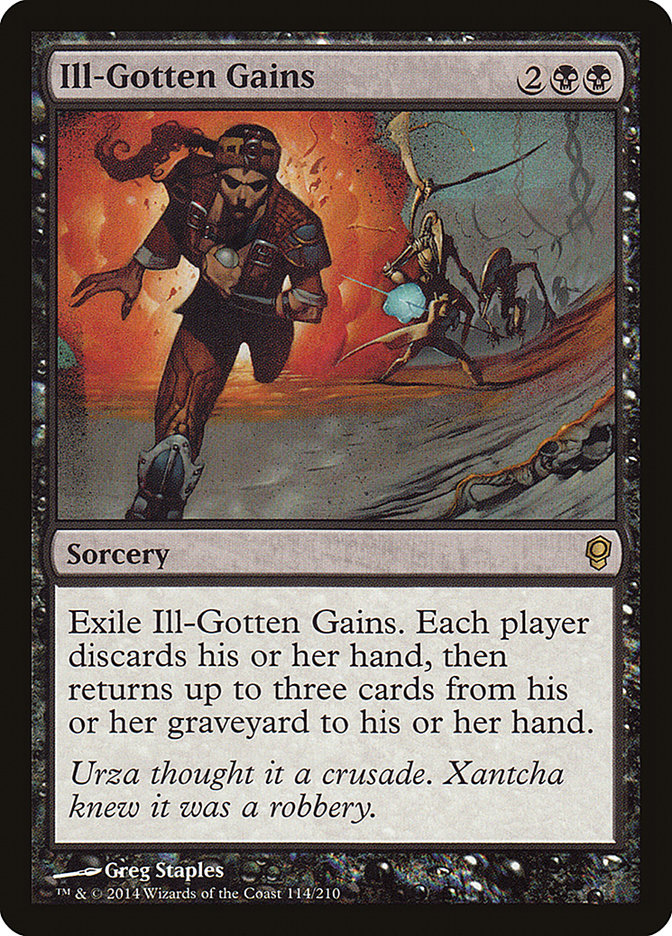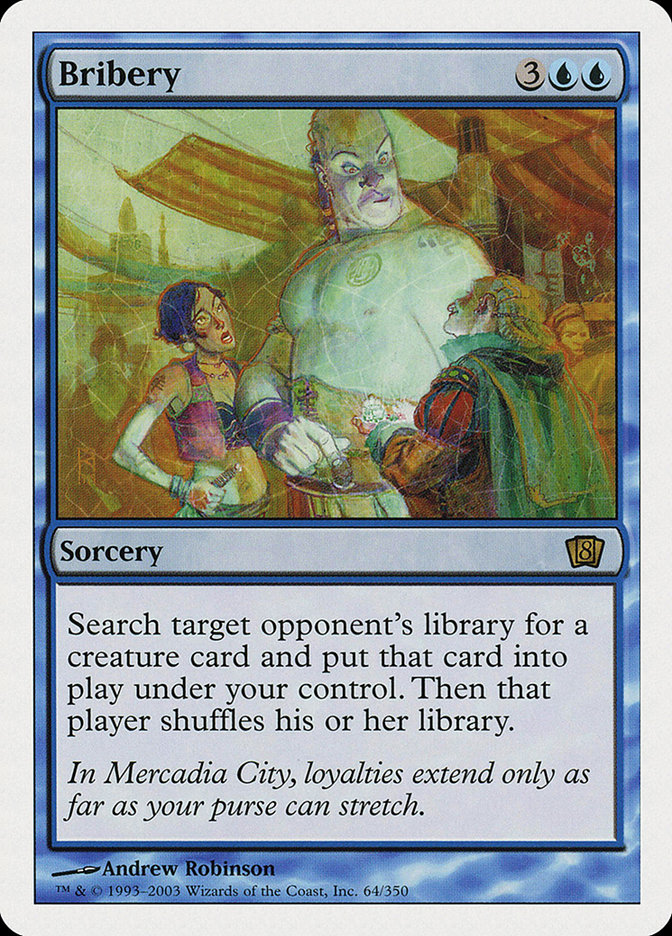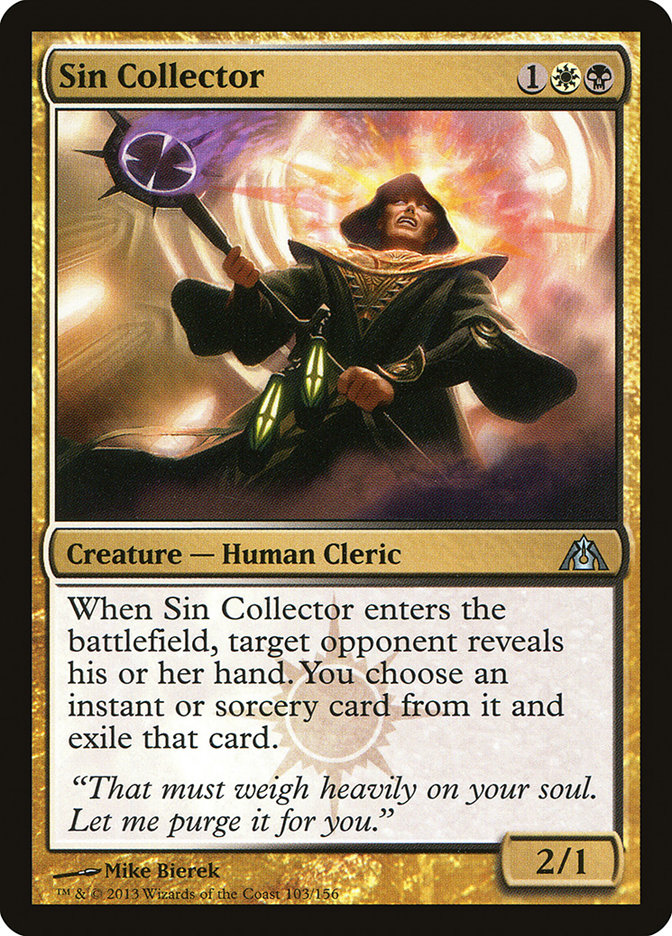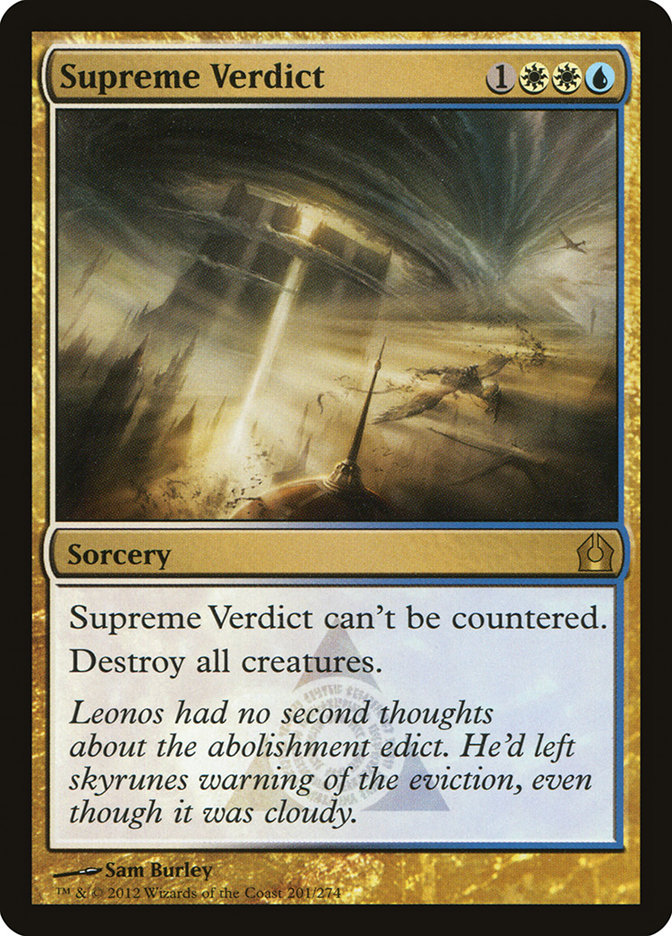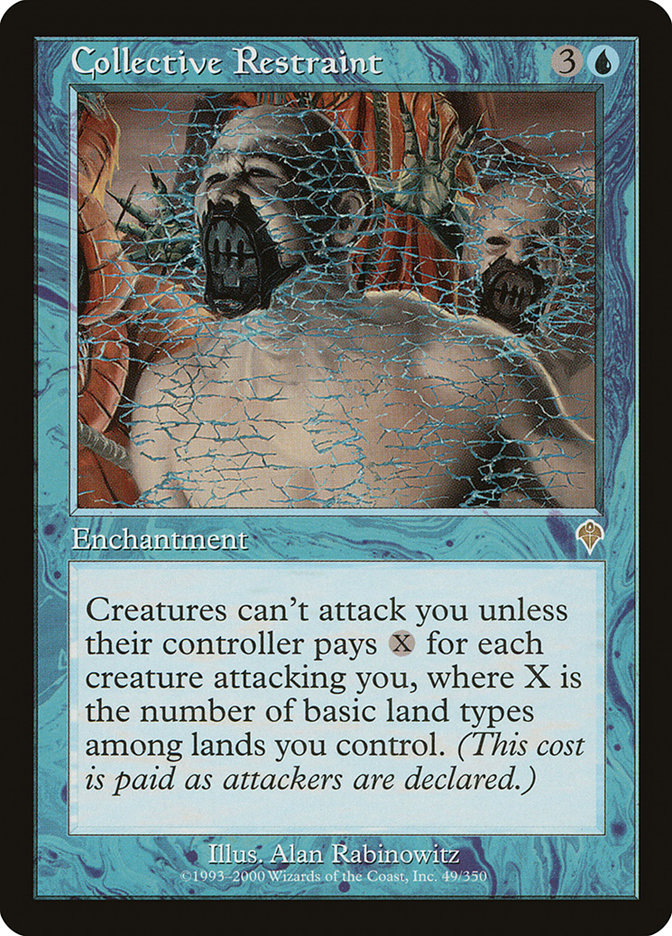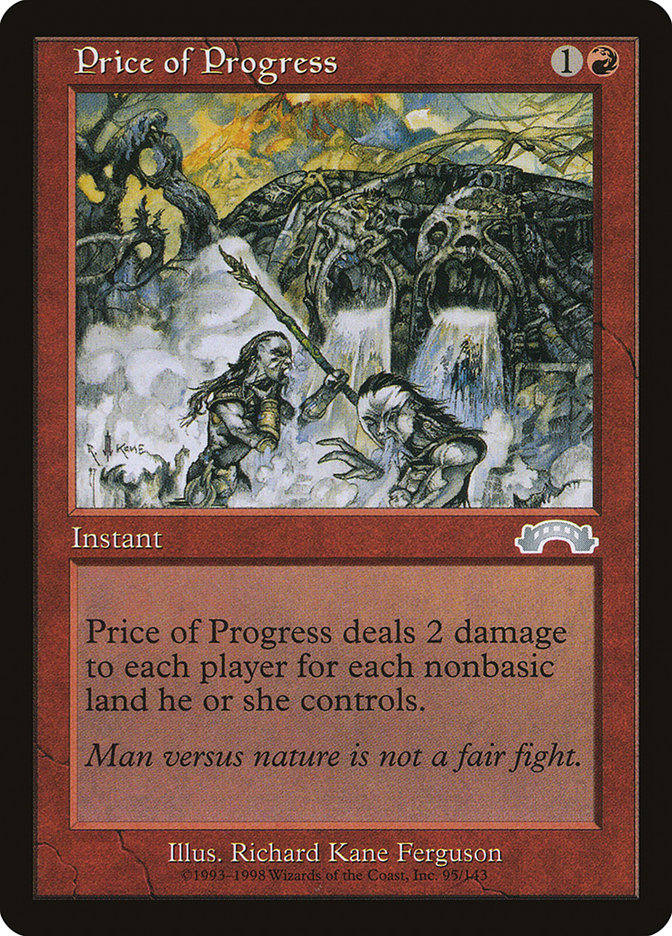I am talking of course, about collusion. Specifically, about a widespread system of quid pro quo bribery in which players in the know concede to others with the implicit understanding that they will receive compensation. Under the rules of enforcement that are in place, experienced players are essentially coached in how to evade punishment by phrasing their offers in such a way that proving their intent would be very difficult, and thus no such attempt is made. The conversation often goes something like this:
Player 1: “Hey, is the (invite, Pro Points, SCG Points) relevant to you at all?”
Player 2: “No.”
Player 1 calls over a judge.
Player 1: “Judge, I would like to ask my opponent to split our prizes, unconditioned on the outcome of our match.”
Player 2: “I agree.”
Player 1: “As a separate matter, would you be willing to concede to me?”
Player 2: “Okay.”
They sign the slip and hand it to the judge, who sanctions these actions.
Later on, Player 1 often pays Player 2 an uneven portion of the split, as a gesture of good will.
If the two players know each other, then this entire process is very easy, as they can openly discuss who needs the win more and have the concession occur without any discussion of a split.
Because any money exchange is kept implicit, it is assumed that these actions are all taken independently, but are any of us naive enough to believe that this would happen if Player 2 did not expect to be compensated? What would their motivation be if they have no personal investment in Player 1’s success?
This is not to say that money is changing hands every time you see a concession at a high-profile event. Concessions do happen with no expectation of and no realization of compensation. But in my experience, expectation of compensation is very much the norm.
Many have argued to me that this is not technically collusion, since Player 2 is not obligated to accept the request for concession, nor is Player 1 forced to offer anything more than an even split of their winnings, but this is merely a farce for the judges. The obligation may not be encoded in the rules of the game, but it is firmly encoded in the unwritten rules of conduct for competitive players.
Were Player 2 to refuse the concession or Player 1 not pay up, word of their actions would spread and they would be labeled as scummy. As punishment for their failure to cooperate, they can now no longer expect to be offered these courtesies in the future, thus costing them some amount of equity.
Does that last paragraph sound at all familiar?
Let me be clear: I am not accusing Eric of cheating. By the rules that are in place, he technically did nothing wrong. Even if Mark had conceded to him and money had changed hands at a later time, they would have simply been acting in accordance with the rest of the community since there would be no way to prove that the two actions were linked in any way. My problem is with the tacit acceptance of this pattern of behavior by our community, even when it is clear that the community of players outside of this circle overwhelmingly disapprove, even when money is not involved.
Clearly there is a disconnect between the large community of casual players and fans and the much smaller community of serious competitive and professional players. In my conversations on this subject with many of my peers, they either do not agree that this is a problem or argue that policing the problem is too daunting a task to undertake.
In regard to the first objection, my reaction is disappointment. We are turning a blind eye to the exchange of money for a match result. This is textbook bribery, whether the DCI agrees or not. In the 1990s, when professional Magic was just starting and cheating was rampant, the judge community was far too disorganized and unprepared to deal with the problem. At that time, players like Chris Pikula and Dave Price took it upon themselves to both spread awareness of the problem, and work with judges to find a solution.
They did not accept the problem as a fact of life and move on, and Chris Pikula’s decision to do so is a large factor in why he will eventually earn a much-deserved and long-overdue seat in the Hall of Fame. His part in that community-driven contribution means much more than any number of Pro Tour Top 8s. Had he and his ilk not stood up and done something, I doubt any of us would be playing outside of our kitchen tables today.
It may seem hyperbolic to compare the issues we face with bribery/collusion to those faced in the 90s with cheating. Cheating in any competition is the ultimate sin. It is a sin from which there is no recovery.
But if we look back, we find that bribery and collusion have been met with the same scorn and derision. Take, for example, The Black Sox, a group of baseball players acquitted of charges they threw the 1919 World Series, but nonetheless were banned from baseball for life. Pete Rose was similarly banned for betting on baseball as both a player and manager, despite his ardent claim that he never bet against his own team.
That this is a horrible crime is obvious in team sports, where your actions also negatively impact teammates, but it is also a cardinal sin in individual competitions. The professional tennis community has come under intense criticism in recent years for allegations of match fixing being both prevalent and ignored, and in 2008, it formed the Tennis Integrity Unit, whose sole job is to investigate and dole out appropriate punishment for such violations.
The point is that, just like cheating, bribery and collusion undermine the integrity of the game, and of our sport. Allowing players to openly practice this behavior casts a stain on all of us, tainting any successes we may have. More concretely, it limits the long-term growth potential of Magic by sullying it as a viable product for consumers in the eSports marketplace. This is not in anyone’s best interests, but it is easy to see why an individual may see differently.
It is obvious that Magic as a spectator sport is on a completely different scale from most, if not all, professional sports. The fan base is much smaller and individual players do not command much money. Only the top tier of Magic players, event staff, and content creators are fortunate enough to make a living from the game. As such, it would not take much monetary incentive to compromise their integrity within the game.
In speaking with many of my peers from across all sectors of the community, this sentiment is quite common. If the behavior is culturally accepted and there is personal incentive to fall in line, then they are going to get theirs. To do otherwise would be sacrificing equity that is too valuable, given the relatively small pie we are sharing.
To me, this argument is disrespectful and shortsighted. First, it demonstrates that you are solely worried with your own personal gain, even at the expense of someone else. If that attitude were to pervade too deeply, then Magic could not possibly grow to its full potential, which should be the goal of every person to whom Magic has meant more than a game, but a life.
Magic may not be as rewarding monetarily as other professions, but it is rewarding in innumerable other ways that make competing for a living worthwhile. It is disheartening to see many of my peers ignore this fact and not feel as though they owe a debt of gratitude to our sport which should be paid with our unrelenting commitment to its growth.
Moral arguments aside, this me-first attitude ignores the very real potential for competitive Magic to grow to a point where a career in it is quite lucrative. Early baseball, football, and basketball players could not have dreamed of what their sports have become, but their passion for their game and its integrity were crucial in creating the multi-billion-dollar industries many of us follow today.
I am not saying that, if we stop bribery, we will all become millionaires with endorsement deals from Red Bull and Monster, but with the rise of eSports like League of Legends and Hearthstone, it seems to me that Magic has a much higher ceiling than most of us realize. Yes, there are barriers that exist to making Magic more popular that do not exist in those games, but they are not insurmountable. And we do ourselves no favors by willingly erecting another one in the tacit approval of the unacceptable behavior of bribery.
Okay. Confession time. While at various points I have declined the opportunity, I have also personally engaged in this behavior a number of times. I have not done so with a clean conscience, but that is of little consequence. That does not diminish the importance of my cause, the faithfulness of my words, or my commitment to my call to action here, but it would be disingenuous to paint myself as a paragon of virtue in this area.
Because of this, I do not hold similar actions against my peers. They are merely following cultural convention that is accepted under the established rules and it is clearly beneficial for them to do so. But to these players, I say there is value in standing against this practice, and you stand to gain much more in the long term by sacrificing in the short term and ending this unethical practice.
So the question then turns to exactly how we can solve the bribery/collusion problem. The obvious answer is to regulate such behavior more stridently. I have always found it puzzlingly obtuse that judges look at the above scenario and claim there is nothing wrong because the transaction is implicit. Seasoned players all understand what is going on there, and I suspect many judges do too.
But it is much easier to ignore the problem, since enforcing it would require making a tough judgment call. We need to tell judges that we are not okay with this practice persisting and, if necessary, give them more leeway to adjudicate such situations more stringently.
This solution does not come without its own problems. Empowering judges to make such judgement calls opens another community to the seductive allure of corruption and it is easy to say that the risks of doing so are too great. Mistakes will be made as the transition will not be perfectly smooth.
That the solution is not perfect is not reason enough to dismiss it. We must consider whether the risks of the solution are worth the benefits. In my opinion, the quality of our judge community has greatly increased over the past ten years and I have no problem entrusting them with the necessary power to preserve the integrity of the game.
Moreover, this is why it is so important that the players take action amongst themselves to collectively work towards a mutually beneficial end. Doing so will make the logistics of policing the problem as easy as possible.
Creating a culture in which such behavior is viewed unfavorably will also diminish the need for judges to make those tough calls. Clearly, we are all worried about the unscrupulous people that will reject the new community standard for their own gain, and those people will undoubtedly arise. And it is our duty to provide such people no quarter in our tournament halls.
With enough support, we can ensure that the value in committing legal bribery will become negative, at which point fewer and fewer people attempt to undermine the system, thereby reducing the strain on judges. Such a culture also has the secondary effect of providing support to judges who make tough, but ultimately correct decisions in catching and punishing those who undermine the competitive integrity of the game.
I would like to close by raising an issue that to my knowledge has heretofore gone unnoticed in the Magic community. In this time of growth, I have seen a significant increase in the discussion of community issues. Recent examples beyond what I have discussed today include the presence of sexism in competitive Magic and the prevalence/acceptance of bullying.
These are issues that have existed for years with various degrees of scrutiny being afforded to them over time. But it is no surprise to me that these issues have become more visible and polarizing after a period of incredible growth.
The Magic community is expanding, and as a result, it must become more inclusive in order to survive. This has created pockets of infighting as those who wish to preserve the status quo, whether motivated by prejudice or nostalgia (as many are), work to defend their cherished community against those whom they perceive as outsiders. When Magic was a niche hobby, the communities surrounding it could operate as they pleased, and the old guard would like to continue that practice.
But that is no longer possible. Magic is too large and contains people from too many different backgrounds with too many points of view. We have to be cognizant of that fact down to the smallest levels if Magic is to continue to grow.
The first card store I frequented was the stereotypical old boys’ club that we all hear about. It was dingy, the language was foul, and the bathroom walls were covered in posters that, let’s say, as a boy of thirteen I very much enjoyed. Had my mom had any inclination of this, I doubt she would have let me spend so much time there. This was not a place that was hospitable for many groups of people, especially women, but I loved it all the same. It was a place where I, a nerdy white kid, belonged.
Despite my fond memories, we all realize that stores like that have no place in today’s Magic community. We have millions more people to accommodate and it is in our best interest to make sure everyone feels as accepted as I did back then. We can still generate the same response, but we must go about it in a different, more open way.
The same principle lies behind the practice of bribery. For much of Magic’s history, the tournament community was small and tight-knit, and they were able to create a culture that favored themselves. That culture is now at odds with a rising group of players that wish to see everyone compete on a level playing field. Once again, it is in our best interest to acquiesce to the rising tide, even if it means accepting that a cherished memory is flawed.
This is not only a change for the better of Magic, it is a change for its survival. A prolonged period of stagnation will mean fans flocking to other eSports, and if Magic survives, it will be by returning to its status as a niche community, one in which no one can reasonably expect to make a living.
Magic is the best game ever made. It’s time we all started acting like it.


